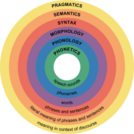
OER Fundamentals are invited to remix this course planning template to design and share their OER project plans, course information and syllabus, and reflection.

OER Fundamentals are invited to remix this course planning template to design and share their OER project plans, course information and syllabus, and reflection.

This course is concerned with the concepts and principles which have been of central significance in the recent development of syntactic theory, with special focus on the “Government and Binding” (GB) / “Principles and Parameters” (P&P) / “Minimalist Program” (MP) approach.
It is the first of a series of two courses (24.951 is taught during the Fall and 24.952 is taught in the Spring). This course deals mostly with phrase structure, argument structure and its syntactic expression, including “A-movement”. Though other issues (e.g. wh-movement, antecedent-contained deletion, extraposition) may be mentioned during the semester, the course will not systematically investigate these topics in class until 24.952.
The goal of the course is to understand why certain problems have been treated in certain ways. Thus, on many occasions a variety of approaches will be discussed, and the (recent) historical development of these approaches are emphasized.
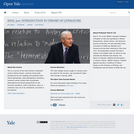
This is a survey of the main trends in twentieth-century literary theory. Lectures will provide background for the readings and explicate them where appropriate, while attempting to develop a coherent overall context that incorporates philosophical and social perspectives on the recurrent questions: what is literature, how is it produced, how can it be understood, and what is its purpose?
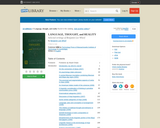
A unique perspective on the confluence of the three basic conceptual frameworks in human experience. Contains several studies, with data, of remarkable world views of disparate cultures based on their specific cultures language. The premise is that how people experience the world, then think about it, then create a language around it, alters their perception of the world in very fundamental ways. The radical notion is that thought and language, creates the circumstances of, and contribute to significantly different realities for different peoples.
The internalization and realization of this concept is significant and can possibly radically alter and change how different cultures assess their ability to, at the most basic levels, understand other cultures realities.

Hands-on experience designing, conducting, analyzing, and presenting experiments on the structure and processing of human language. Focuses on constructing, conducting, analyzing, and presenting an original and independent experimental project of publishable quality. Develops skills in reading and writing scientific research reports in cognitive science, including evaluating the methods section of a published paper, reading and understanding graphical displays and statistical claims about data, and evaluating theoretical claims based on experimental data. Instruction and practice in oral and written communication provided.

Lang101 Workbook offers 460 commented exercises and activities, designed for absolute beginners to the study of language or for anyone curious about (why) language matters. It features empirical observation of 20 typologically distinct languages, including English and other languages you’re familiar with. As a companion tool to our textbook The Language of Language, Part 1 of the workbook contains 360 exercises and activities corresponding to the textbook's 12 chapters (30 per chapter), and 100 synthesising cross-chapter exercises. Part 2 contains commented answers to all exercises. Topics include the nature of scientific investigation; the structure of words, sounds and sentences; typical vs. disordered uses of language; child language, language learning and language play, as well as politeness, persuasion and humour.

Lang101 Workbook offers 460 commented exercises and activities, designed for absolute beginners to the study of language or for anyone curious about (why) language matters. It features empirical observation of 20 typologically distinct languages, including English and other languages you’re familiar with. As a companion tool to our textbook The Language of Language, Part 1 of the workbook contains 360 exercises and activities corresponding to the textbook's 12 chapters (30 per chapter), and 100 synthesising cross-chapter exercises. Part 2 contains commented answers to all exercises. Topics include the nature of scientific investigation; the structure of words, sounds and sentences; typical vs. disordered uses of language; child language, language learning and language play, as well as politeness, persuasion and humour.

This course is an introduction to language acquisition, a subfield of linguistics whose goal is to understand how humans acquire the ability to speak and understand a language—a highly complex task that is routinely and seemingly effortlessly accomplished by competent (native) speakers of the language in the first few years of life and without explicit instruction. By contrast, acquiring a second language after the critical period takes a long time, is effortful, usually requires explicit instruction and correction, and often fails to reach a level of competency that native speakers of the language have.
Focusing on first language acquisition—the process by which native speakers of a language acquire the ability to speak and understand that language—this course covers selected topics in core areas of linguistic knowledge, including the lexicon (words), sentence structure, meaning composition, and pragmatics, from a developmental perspective.

This course covers some of the basic ideas in the subfield syntax, within the framework often referred to as “Generative Grammar”.

This course will acquaint you with some of the important results and ideas of the last half - century of research in syntax. We will explore a large number of issues and a large amount of data so that you can learn something of what this field is all about. From time to time, we will discuss related work in language acquisition and processing. The class will emphasize ideas and arguments for these ideas in addition to the the details of particular analyses. At the same time, you will learn the mechanics of one particular approach (sometimes called Principles and Parameters syntax).
Most of all, the course tries to show why the study of syntax is exciting, and why its results are important to researchers in other language sciences. The class assumes some familiarity with basic concepts of theoretical linguistics, of the sort you could acquire in 24.900.

If you've ever wondered why we need concepts like noun and verb or word and phrase when discussing language, this book is for you. Deliberately selective in its approach and assuming no prior knowledge of linguistics, The Language of Language explores the nature of language and linguists' agreed-upon ways of talking about the object of their inquiry. Our focus is on modes of thinking rather than content knowledge. Our goal is to encourage informed thinking about (why) language matters, so that you can continue puzzling about language issues long after you've worked your way through this book.Now in its third edition, the book is packed with over 100 commented activities, examples of language play, and fun food for thought, designed to whet your appetite for linguistics and language studies.The companion workbook, Lang101 Workbook, contains 460 additional commented exercises and activities, designed for self-study or for the classroom.

Asking and answering questions about what culture entails and examines the fundamental properties and intertwining nature of language and culture. This text explores linguistic relativity, lexical differences among languages and intercultural communication, including high and low contexts.
Changes to a variety of OER works were made by Manon Allard-Kropp in the Department of Language and Cultural Studies to tailor the text to fit the needs of the Languages and World View course at the University of Missouri–St. Louis. Materials from the original sources have been combined, reorganized, and added to by the current author, and any conceptual or typographical errors are the responsibility of the current author.

This course provides an overview of the distinctive features which distinguish sound categories of languages of the world. Theories which relate these categories to their acoustic and articulatory correlates, both universally and in particular languages, are covered. Models of word recognition by listeners, features, and phonological structure are also discussed. In addition, the course offers a variety of perspectives on these issues, drawn from Electrical Engineering, Linguistics and Cognitive Science.

This course is about the study of speech sounds; how we produce and perceive them and their acoustic properties. Topics include the influence of the production and perception systems on phonological patterns and sound change, students learn acoustic analysis and experimental techniques. Students taking the graduate version complete different assignments.

This course is a detailed examination of the grammar of Japanese and its structure which is significantly different from English, with special emphasis on problems of interest in the study of linguistic universals. Data from a broad group of languages is studied for comparison with Japanese. This course assumes familiarity with linguistic theory.
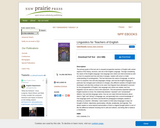
The primary goals of this text are to acquaint prospective teachers of English with certain aspects of the history, structure, and use of the English Language. Through considering the nature of the English language; how language and culture are interconnected as well as how it is acquired and how and why it changes, readers will come to a fuller understanding of sociolinguistics. This text discusses the nature of language, as well as how it is acquired; how and why languages change, and how the English language in particular has changed (and continues to change); why different varieties of English have developed, and why they continue to be used; how linguists have attempted to account for the (ir)regularities of English; how language and culture are related; and how linguistics can be used as a tool in the classroom. This text presents important topics for English teachers to know: the relationship between “standard” and “nonstandard” dialects, how and why language varies, how we can make informed decisions about what is “right” and “wrong” in language use, and generally how a sound knowledge of how language works can inform and benefit the pedagogical strategies needed to develop as a teacher. Ultimately, I want readers to think about language in ways not thought of before: objectively, passionately, critically, analytically, and logically. This allows readers to move beyond memorization of facts to original thought (which is sort of like the difference between knowing how to add and subtract, and being able to balance a checkbook).

This seminar explored the idea that the study of linguistics can be a means to develop young people’s understanding of scientific inquiry as well as their understanding of the nature of language. The challenge of this seminar was to create pedagogical materials and methods that will motivate learners of all ages to be inquisitive about their native language and about language in general. Seminar participants worked with one another and in partnership with K–12 teachers to accomplish this goal.

The mission of the MIT-Haiti Initiative is to promote active learning in Kreyòl so that Haitians can have universal access to quality education in the language that most of them speak at home.
Platfòm MIT-Ayiti, launched in 2019, offers a wealth of freely accessible educational resources in Kreyòl, including downloadable lesson plans and picture books categorized by topic, alongside official curricula from Haiti’s Ministry of National Education. The target audience for these resources includes students at all levels from pre-kindergarten through high school, and we offer materials in all disciplines. We also host and invite contributions from all educators who are willing to submit their own materials in Kreyòl. We work with these contributions, in konbit (collaborative) mode, to improve these submissions before publication. Men anpil, chay pa lou! (That is, many hands make light work!)
The Initiative’s original website, launched in 2010, includes software tools for math, physics, genetics, and biochemistry education, as well as a preliminary (work-in-progress) glossary of Kreyòl equivalents for English words commonly used in the STEM disciplines.
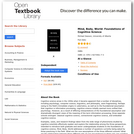
Cognitive science arose in the 1950s when it became apparent that a number of disciplines, including psychology, computer science, linguistics, and philosophy, were fragmenting. Perhaps owing to the field’s immediate origins in cybernetics, as well as to the foundational assumption that cognition is information processing, cognitive science initially seemed more unified than psychology. However, as a result of differing interpretations of the foundational assumption and dramatically divergent views of the meaning of the term information processing, three separate schools emerged: classical cognitive science, connectionist cognitive science, and embodied cognitive science.
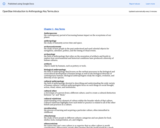
The Key Terms resource is provided in .docx format. It includes terms extracted directly from the textbook and organized by chapter. Each key term is bolded and followed by its definition in context.